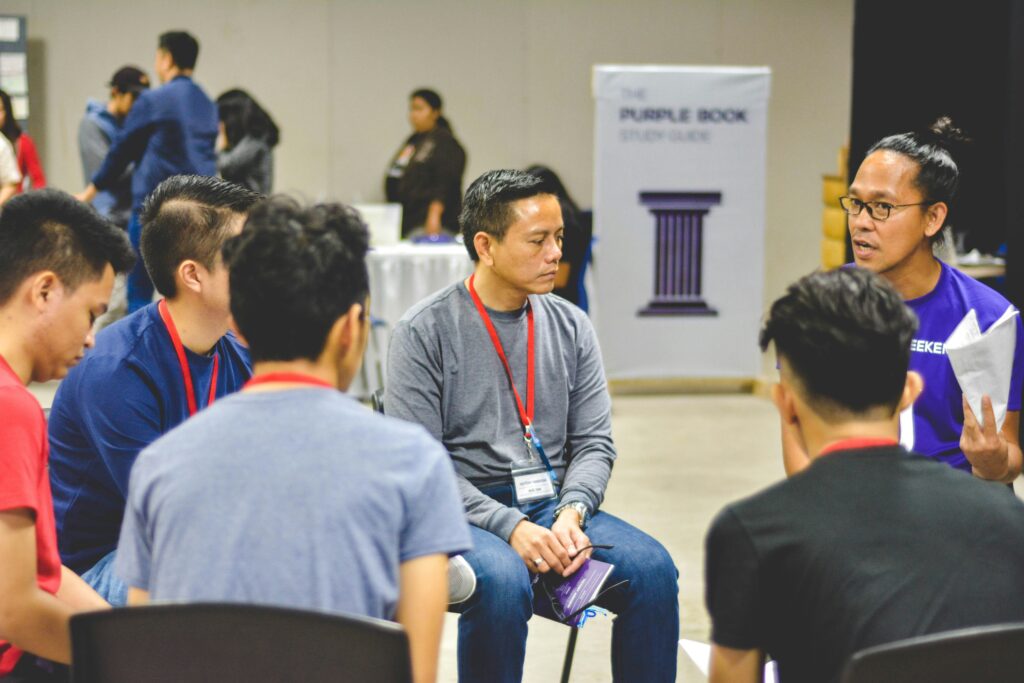Introduction
Mastering group discussions can feel daunting, especially for introverts who thrive in more reflective, one-on-one settings. However, embracing group discussions is a vital skill, and yes, it’s possible to shift from an introvert to a more extroverted approach 🌟. This doesn’t mean changing who you are, but rather expanding your comfort zone in social settings. The journey of an introvert to extrovert transition is unconventional, yet many are finding it rewarding. It’s about harnessing your natural analytical strengths and adopting a positive, can-do attitude. Simple, clear strategies can empower you to participate more actively and confidently in any group setting. 🚀

Introduction to Group Discussions: Importance and Benefits
In the journey of mastering group discussions, understanding their importance and benefits is the first step. Group discussions are not just about talking or listening; they’re a blend of exchanging ideas, learning from others, and developing interpersonal skills. For introverts, who often excel in analytical thinking and deep concentration, group discussions offer a unique platform to showcase these strengths.
Engaging in group discussions allows you to broaden your perspective. By listening to diverse viewpoints, you gain insights that might not have occurred in a solitary environment. It’s a chance to see how others process information and approach problems, which can be incredibly enlightening. Moreover, participating in these discussions hones your ability to articulate thoughts clearly and concisely – a valuable skill in both personal and professional spheres.
Another significant benefit is the development of critical thinking and quick problem-solving skills. In a group setting, you’re often required to think on your feet, a challenge that can push your cognitive abilities to new heights. It’s a safe space to test your ideas, receive immediate feedback, and refine your arguments based on others’ inputs.
For introverts, who might typically prefer pre-planned and structured environments, group discussions can seem intimidating. However, they offer a unique opportunity for growth. These settings encourage stepping out of your comfort zone and adapting to dynamic situations – a crucial skill in today’s fast-paced world.
Additionally, group discussions are excellent for networking and building relationships. They provide a platform to connect with like-minded individuals, share experiences, and develop bonds based on mutual interests and challenges.
Remember, mastering group discussions isn’t about dominating the conversation; it’s about meaningful participation, active listening, and contributing constructively. By engaging in these forums, you not only gain knowledge but also build confidence and improve social interaction skills. So, take our introvert test to better understand your strengths and areas for growth as you embark on this journey.

Preparing for a Group Discussion: Research and Practice Tips
Preparing for a group discussion is more than just showing up; it’s about being ready to engage thoughtfully and effectively. For introverts, this preparation is crucial, as it helps build confidence and eases the anxiety associated with spontaneous social interactions. The first step is to join a supportive community, like our intro to extro community, where you can discuss and share experiences with others who are on a similar path.
Research is a key element in preparation. Before a group discussion, take the time to understand the topic thoroughly. This means going beyond surface-level information and diving into various aspects of the subject. For analytical minds, this is a sweet spot – gathering facts, statistics, and case studies can provide a solid foundation for your contributions. Having this arsenal of information not only boosts your confidence but also ensures that your contributions are valuable and well-received.
Practical tips for preparation include creating a list of potential points and questions related to the topic. This list acts as a safety net, ensuring you have something to fall back on if you find yourself struggling to participate. Additionally, try to anticipate the perspectives and arguments others might bring to the discussion. This mental exercise prepares you to engage more actively, whether by supporting, refuting, or adding to their points.
Another important aspect of preparation is setting personal goals for the discussion. These goals could range from simply voicing a certain number of points to taking on a mediator role during heated debates. Setting such goals helps in tracking your progress and provides a sense of achievement post-discussion.
Lastly, practice makes perfect. Engage in mock discussions with friends or family, or even in front of a mirror. This practice helps in refining your communication skills, including body language and voice modulation, which are crucial in conveying your points effectively. Remember, preparation is about building a comfortable framework within which you can freely express your thoughts and ideas.

Overcoming Shyness: Strategies for More Confident Speaking
Overcoming shyness in group discussions is a significant hurdle for many introverts, but with the right strategies, it’s entirely possible to speak confidently and make your voice heard. Embracing this challenge is part of the intro to extro roadmap, a guide quite different from conventional approaches, focusing on gradual and authentic self-improvement.
The first step in overcoming shyness is acknowledging it, not as a flaw, but as a natural part of your personality that can be managed. Recognizing this allows you to approach group discussions with a mindset focused on growth rather than on immediate perfection. Start by setting small, achievable speaking goals in each discussion, like making at least one or two points. These small victories build confidence over time.
Another effective strategy is to begin your participation with questions rather than statements. Questions are a great way to get involved without the pressure of stating an opinion. They show that you are engaged and provide an opportunity to steer the discussion towards topics you are comfortable with.
Also, remember that your contribution doesn’t always have to be groundbreaking or highly intellectual. Offering a simple agreement, sharing a relevant experience, or even paraphrasing what someone else has said can be valuable. These contributions keep the conversation flowing and build your confidence in speaking up.
Practicing mindfulness and relaxation techniques can also help manage the physical symptoms of anxiety, such as a racing heart or trembling voice. Techniques like deep breathing or visualization can calm your nerves and prepare you mentally before entering a discussion.
Lastly, embrace the power of preparation. Being well-prepared on the topic can significantly boost your confidence. When you feel knowledgeable, you’re more likely to feel comfortable sharing your thoughts.
Overcoming shyness is not about transforming into a completely different person; it’s about learning to express your thoughts confidently while staying true to your introverted nature. Remember, each group discussion is an opportunity to take a step forward on this journey.

Building on Others’ Ideas: Collaboration in Group Discussions
Building on others’ ideas in group discussions is a skill that, when mastered, not only enhances collaboration but also demonstrates active participation and respect for fellow participants. This approach is particularly advantageous for introverts, who often excel in thoughtful analysis and can contribute significantly by expanding on or refining the ideas presented by others.
To effectively build on others’ ideas, active listening is key. It involves fully concentrating on what is being said, rather than merely hearing the words. This attentiveness allows you to understand the nuances of the discussion and identify opportunities to contribute constructively. When you listen with intent, you’re more likely to notice points that resonate with your own thoughts or experiences, providing a natural entry point for your input.
When you do contribute, acknowledge the original speaker’s point before adding your perspective. Phrases like “Building on what [name] said…” or “I agree with [name] and would like to add…” show that you value their contribution and are engaged in the conversation. This approach fosters a collaborative atmosphere and encourages others to similarly engage with your ideas.
Another aspect of building on ideas is the ability to connect different points raised during the discussion. By drawing connections between various contributions, you create a more cohesive and comprehensive understanding of the topic. This not only demonstrates your analytical skills but also enhances the group’s collective insight.
Incorporating your unique perspective is also important. As an introvert, you may have reflections or insights that others might not immediately consider. Sharing these can introduce new angles to the discussion, enriching the overall conversation.
Remember, the goal isn’t to dominate the discussion but to contribute meaningfully. Whether it’s by reinforcing, questioning, or adding a new dimension to an idea, your participation is valuable. It’s about creating a balance where everyone’s contributions are recognized and built upon, leading to a more productive and inclusive group discussion.
The Power of Questions: Engaging Others in the Discussion
The power of questions in engaging others during group discussions cannot be overstated, especially for introverts who may prefer to probe deeper rather than dominate the conversation with their own views. Asking thoughtful questions is a strategy that not only keeps the discussion dynamic but also shows that you are actively engaged and interested in understanding others’ perspectives.
Crafting effective questions requires a blend of active listening and analytical thinking. Start by closely following the discussion and identifying key points or statements that intrigue you or require further clarification. This attentiveness ensures that your questions are relevant and add value to the conversation.
When framing your questions, aim for openness and curiosity. Open-ended questions, as opposed to yes/no questions, encourage more detailed responses and further discussion. For example, asking “What do you think led to this outcome?” instead of “Do you agree with this outcome?” invites a more elaborate response, providing deeper insights into the topic and the thoughts of your peers.
Your questions can also serve to bring quieter members into the conversation. Asking someone directly for their opinion or thoughts on a particular point can empower them to share their perspectives, contributing to a more inclusive and diverse discussion. This approach is particularly effective for introverts, as it shifts the focus from speaking to facilitating, a role where they can excel without feeling the pressure to constantly voice their opinions.
Moreover, asking questions can help in steering the discussion in a direction where you feel more comfortable contributing. If the conversation is veering off into unfamiliar territory, a well-placed question can bring it back to a topic where you have more to say.
In essence, the art of asking questions lies in balancing curiosity with contribution. It’s about keeping the discussion flowing and engaging, drawing out the thoughts and opinions of others, and providing a platform for a richer, more collaborative exchange of ideas.
The Importance of Closure: Summarizing and Concluding Discussions
The importance of closure in group discussions often goes underappreciated, yet it plays a crucial role in ensuring that the conversation is productive and leaves participants with a sense of accomplishment. For introverts, who may prefer structured and conclusive environments, effectively summarizing and concluding discussions can be an area where they excel, providing a valuable contribution to the group dynamic.
Effective closure involves summarizing the key points discussed, highlighting any consensus reached, and noting divergent views that emerged. This process allows the group to reflect on what has been achieved and ensures that everyone leaves with a clear understanding of the discussion’s outcomes. As an introvert, you can leverage your natural inclination towards observation and analysis to succinctly encapsulate the essence of the conversation.
In addition to summarizing, proposing actionable steps or follow-up actions can be a significant contribution. This might involve suggesting further discussions on unresolved topics, assigning tasks based on the discussion, or even just agreeing on the key takeaways. Such initiatives demonstrate leadership and a proactive approach to turning discussion into action.
It’s also important to acknowledge the contributions of all participants as part of the closing. This not only fosters a sense of community and mutual respect but also encourages continued participation in future discussions. As someone who may understand the value of recognition, especially for those who may have spoken less, your acknowledgment can be especially empowering.
Finally, soliciting feedback on the discussion process can be an effective way to conclude. This can involve asking for thoughts on what went well and what could be improved for next time. Such feedback is invaluable for continuous improvement of group dynamics and ensures that future discussions are even more effective and inclusive.
In summary, the role of concluding a discussion is not just about ending a conversation, but about ensuring that it has been meaningful and productive. For introverts, mastering this aspect of group discussions can be a powerful way to contribute and demonstrate leadership in a way that aligns with their strengths and comfort zones.
Conclusion
In conclusion, mastering group discussions is a multifaceted skill that involves preparation, participation, and thoughtful conclusion. It’s a journey particularly relevant for introverts, who bring unique strengths to the table, such as deep listening, analytical thinking, and a thoughtful approach to communication. By understanding the importance of group discussions, preparing adequately, overcoming shyness, building on others’ ideas, asking insightful questions, and effectively summarizing discussions, introverts can not only participate more actively but also enrich the overall quality of the conversation.
Each of these steps plays a crucial role in making group discussions more productive, inclusive, and enjoyable for all participants. Whether it’s through preparing thoroughly, engaging confidently, contributing constructively, or bringing discussions to a meaningful close, introverts have much to offer in group settings. The key lies in recognizing and leveraging their inherent strengths, while also stepping out of their comfort zones to embrace new challenges and opportunities for growth.
Ultimately, the ability to navigate and contribute to group discussions is not just a skill but an avenue for personal and professional development. It’s about finding the balance between listening and speaking, reflecting and responding, and staying true to oneself while adapting to group dynamics. For introverts looking to expand their horizons, mastering group discussions is a rewarding endeavor, opening doors to new perspectives, deeper connections, and greater self-confidence.




